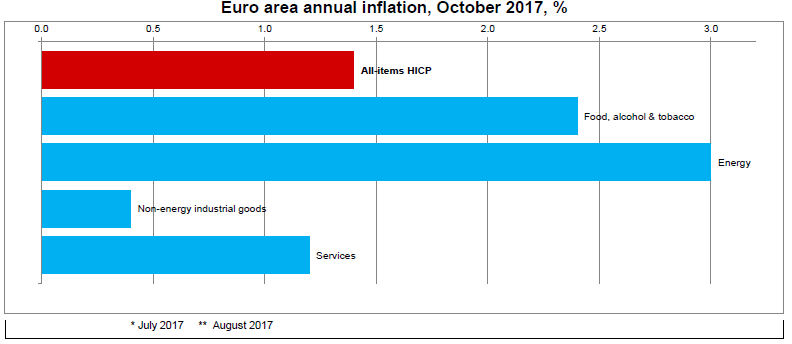Holger Schmieding, Florian Hense, (2017), “Η Ευρωζώνη σε τροχιά σταθερής ανάπτυξης”, Καθημερινή, 1 Νοεμβρίου H Ευρωζώνη συνεχίζει να αναπτύσσεται σε υψηλότερους του αναμενόμενου ρυθμούς, δημιουργώντας πρόσφορο έδαφος για μια προς πάνω αναθεώρηση των εκτιμήσεων την επόμενη διετία. Για πρώτη φορά ύστερα από πολλά χρόνια, η οικονομική δραστηριότητα στην Ευρωζώνη ενισχύθηκε σε ταχύτερους ρυθμούς απ’ ό,τι οι ΗΠΑ και η Βρετανία κατά τη διάρκεια των εννέα μηνών του 2017, με τον …Read More
GDP up by 0.6% in both the euro area and the EU28
Eurostat/GDP up by 0.6% in both the euro area and the EU28/31 Οκτωβρίου, 2017 Seasonally adjusted GDP rose by 0.6% in both the euro area (EA19) and in the EU28 during the third quarter of 2017, compared with the previous quarter, according to a preliminary flash estimate published by Eurostat, the statistical office of the European Union. In the second quarter of 2017, GDP had grown by 0.7% in both zones. Σχετικές Αναρτήσεις …Read More
Euro area annual inflation down to 1.4%
Eurostat/Euro area annual inflation down to 1.4%/31 Οκτωβρίου 2017 Euro area annual inflation is expected to be 1.4% in October 2017, down from 1.5% in September 2017, according to a flash estimate from Eurostat, the statistical office of the European Union.Looking at the main components of euro area inflation, energy is expected to have the highest annual rate in October (3.0%, compared with 3.9% in September), followed by food, alcohol & tobacco …Read More
September 2017, Euro area unemployment at 8.9% – EU28 at 7.5%
Eurostat/September 2017,Euro area unemployment at 8.9%-EU28 at 7.5%/31 Οκτωβρίου 2017 The euro area (EA19) seasonally-adjusted unemployment rate was 8.9% in September 2017, down from 9.0% in August 2017 and from 9.9% in September 2016. This is the lowest rate recorded in the euro area since January 2009. The EU28 unemployment rate was 7.5% in September 2017, stable compared to August 2017 and down from 8.4% in September 2016. This remains the lowest rate …Read More
Creating Long-Term Value in Europe’s Capital Markets: Opportunities and constraints
Amariei, C. (2017), “Creating Long-Term Value in Europe’s Capital Markets: Opportunities and constraints”, 1st Interim Report of the CEPS-ECMI Task Force on Asset Allocation in Europe, Brussels, 30 Οκτωβρίου Many factors – changing economic/financial conditions, evolving demographics and regulatory as well as technological developments – will impact asset allocation in the coming years. In anticipation of these changes, the Mid-Term Review of the Capital Markets Union (CMU) Action Plan set out …Read More
Behavioural economics is also useful in macroeconomics
Paul De Grauwe, Yuemei Ji, (2017), “Behavioural economics is also useful in macroeconomics”, VoxEU, 1 Νοεμβρίου Behavioural economics is seeing increased acceptance as a legitimate way of thinking about economic issues. The recent awarding of the Nobel Prize to Richard Thaler testifies that there has been a change of view within the economics profession on the need to allow for departures from the paradigm of the ‘homo economicus’. Σχετικές Αναρτήσεις …Read More
Rethinking Working Time In Europe
Jorge Cabrita, (2017), “Rethinking Working Time In Europe”, Social Europe, 1 Νοεμβρίου The results of recent Eurofound research on working time patterns in the EU constitute a strong plea for working time policies that clearly acknowledge the life course perspective. This means that working time must not only be thought and organised in daily, weekly, monthly and/or yearly terms but also take into full consideration the different stages of our …Read More
Europe’s Economic Dilemma
Martin Feldstein, (2017), “Europe’s Economic Dilemma”, The Project Syndicate, 30 Οκτωβρίου The European Central Bank deserves credit for the economic improvements that have occurred in the past few years. But the ECB’s policies also mean that the eurozone has no ammunition left to fight the next recession, because interest rates cannot be reduced further and fiscal policy remains in the hands of national governments. Σχετικές Αναρτήσεις Jean Tirole, (2017), «The European …Read More
Coeure: H παράταση του QE έως τον Σεπτέμβριο του 2018 θα είναι η τελευταία
Capital.gr, (2017), “Coeure: H παράταση του QE έως τον Σεπτέμβριο του 2018 θα είναι η τελευταία”, 30 Οκτωβρίου Την αισιοδοξία του ότι η παράταση του προγράμματος αγορών ομολόγων της Ευρωπαϊκής Κεντρικής Τράπεζας (ΕΚΤ) έως τον Σεπτέμβριο του 2018 θα είναι η τελευταία, εξέφρασε το μέλος του Εκτελεστικού Συμβουλίου της, Μπενουά Κερέ. Σχετικές Αναρτήσεις Η Καθημερινή, (2017), «Η ΕΚΤ μειώνει τη μηνιαία αγορά ομολόγων και παρατείνει το QE», 28 Οκτωβρίου Δημήτρης Στόλης,(2017), …Read More
Η ΕΚΤ μειώνει τη μηνιαία αγορά ομολόγων και παρατείνει το QE
Η Καθημερινή, (2017), “Η ΕΚΤ μειώνει τη μηνιαία αγορά ομολόγων και παρατείνει το QE”, 28 Οκτωβρίου Την πρόθεσή της να συνεχίσει την πολιτική ποσοτικής χαλάρωσης αν επιδεινωθεί το οικονομικό τοπίο στην Ευρωζώνη ξεκαθάρισε αυτήν την εβδομάδα η Ευρωπαϊκή Κεντρική Τράπεζα (ΕΚΤ), διατηρώντας παράλληλα σε ιστορικά χαμηλά επίπεδα τα επιτόκιά της. Κατέστησε σαφές ότι θα κινηθεί πολύ προσεκτικά όσον αφορά την αλλαγή της χαλαρής νομισματικής πολιτικής που έχει υιοθετήσει από τον Μάρτιο …Read More







